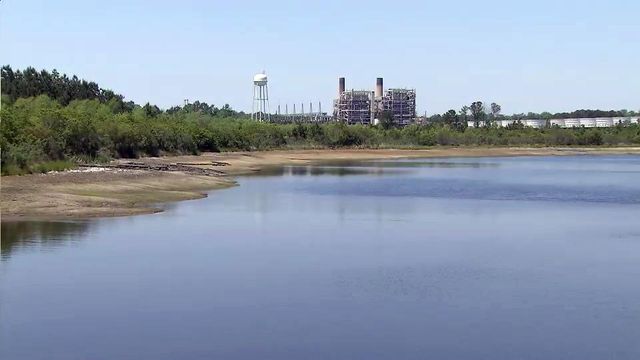House plan creates deadline loophole for cleaning coal ash ponds
Duke Energy could bypass deadlines for cleaning up its North Carolina coal ash ponds under a revised bill that House members introduced Tuesday.
Posted — UpdatedThe Senate last week approved legislation that would require Duke to close and clean up all of its ash ponds within 15 years.
Four "high-risk" coal ash sites would have to be closed by Aug. 1, 2019, and the state would prioritize the other 10 North Carolina sites where ash is stored in giant lagoons. Any others rated as high risks would have a Dec. 31, 2019, deadline assigned for cleanup, while those rated as intermediate risks would have to be excavated and closed by the end of 2024. Sites deemed low risk could be covered and left in place but would have to be closed by the end of 2029.
A proposal that the House Environment Committee was expected to debate Wednesday would give the Department of Environment and Natural Resources secretary the power to grant a variance to any deadline if Duke shows "compliance with the deadline cannot be achieved by application of best available technology found to be economically reasonable at the time and would produce serious hardship without equal or greater benefits to the public," according to a summary of the bill.
"We want to make sure the timelines are workable," said Rep. Ruth Samuelson.
Rep. William Brisson, D-Bladen, said the quick turnaround on cleaning up ash ponds, which have sat near coal-fired power plants across the state for years, makes it appear that lawmakers are in "panic-type mode."
Brisson said he didn't know much about ash ponds until February, when a broken stormwater pipe at a retired Duke plant near Eden dumped about 39,000 tons of ash into the Dan River, fouling 70 miles of the river with toxic sludge. The Eden plant and sites near Wilmington, in Asheville and in Gaston County are the four high-priority sites to be cleaned up first.
"I'm not sure how we're going to it corrected and clean it all up in four years," Brisson said. "We're making panicked decisions, and my experience making decisions (in) a panic is that, most of the time, it comes out with not good decisions."
Duke officials have chafed at the hard deadlines in the Senate bill, saying they aren't confident the company can meet them.
George Everett, the utility's director of environmental and legislative affairs, told lawmakers Tuesday that Duke needs time to assess each site and determine the best course of action.
"We just need time to do it, and we'll do it right," Everett said.
The House bill also calls for a study that could allow Duke to leave some low-risk ash ponds in place without any remedial action. A new Coal Ash Management Commission would determine if "natural attenuation" would be the best course of action at sites shown to have no groundwater or surface water contamination.
Environmentalists pleaded with House members to toughen up the Senate bill, and they were sorely disappointed by the changes the House proposed.
"The bill falls way short of anything that North Carolinians were depending upon to protect our water," said Matthew Starr, who monitors ash ponds near Goldsboro as Upper Neuse Riverkeeper. "It took a fairly weak Senate bill and made it weaker. That’s really disconcerting when you’re talking about the environment and people’s health."
Donna Lisenby of the Waterkeepers Alliance called the Senate bill "the tallest midget at the circus" and said the House needs to ensure that no coal ash pond is left in place to pose a threat to drinking water.
"There is no low-risk coal ash pond in North Carolina," Lisenby said.
Mary Maclean Asbill, an attorney with the Southern Environmental Law Center, questioned why House members were rushing the revised bill through committee instead of allowing lawmakers and the public a chance to review it and discuss ways to improve it.
The SELC notified Duke and DENR on Tuesday that it was seeking Clean Water Act violations against plants in Moncure, Goldsboro and Salisbury in an effort to get ash ponds at those sites cleaned up more quickly.
"These coal ash lagoons threaten public drinking water supplies, flow illegally into rivers and groundwater and have unsafe dams,” Frank Holleman, a senior attorney at SELC. “Yet, Duke Energy has not cleaned up these sites, and DENR has not required Duke Energy to clean them up.”
Related Topics
• Credits
Copyright 2024 by Capitol Broadcasting Company. All rights reserved. This material may not be published, broadcast, rewritten or redistributed.





